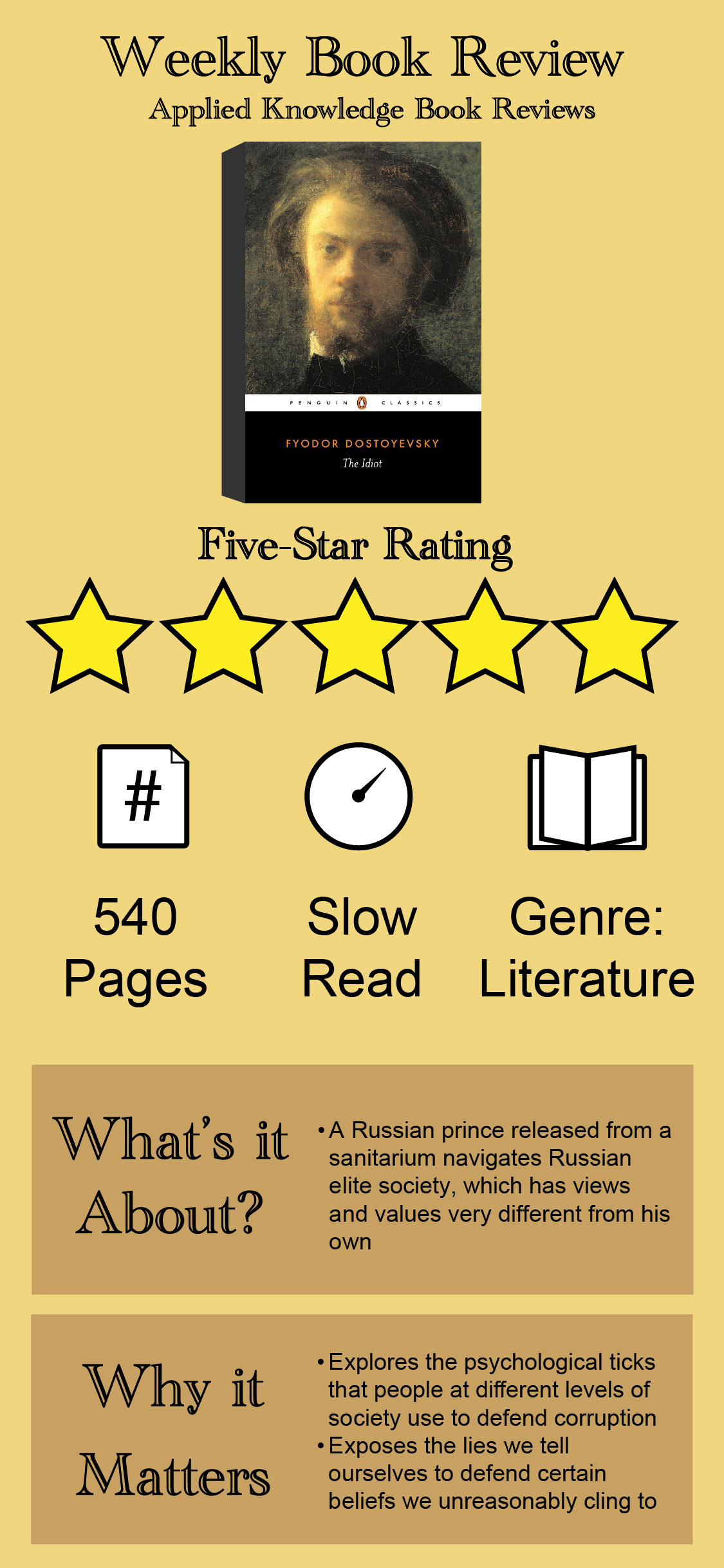An Exploration of Hope, Death, and Sanity
Dostoyevsky's The Idiot brings some of the most interesting existential conversations to life.
It’s hard to know where to begin with a book like The Idiot. It’s the story of a naive, overly kind man navigating elite Russian society, but describing the plot of a Dostoyevsky novel fails to do justice to the book’s content.
The most fascinating parts of the novel are passages that delve into deep subjects like whether state execution by guillotine is worse than having one’s throat slit by a bandit. (Apparently, we’re a Dostoyevsky house. My wife’s favorite book is Crime and Punishment.)
I’m always struck by how funny and readable Dostoyevsky is for a book written in 1869. Anyone looking for a great exploration of psychology can mine The Idiot for years. I have two passages that have stuck with me since I read it in 2019. One is Myshkin’s thoughts about the horrors of capital punishment compared to surprise death. The other is the narrator comparing the types of morans he perceives in the novel.
Hope Can Make or Break a Horrific Death
On his way to meet General Ivan Fyodorovitch Yepanchin, Prince Myshkin has a conversation with the general’s footman. The conversation turns to France’s practice of capital punishment with the guillotine, and the footman remarks that the deaths are at least painless. Myshkin disagrees:
“…the chief and worst pain may not be in the bodily suffering but in one’s knowing for certain that in an hour, and then in ten minutes, and then in half a minute, and then now, at the very moment, the soul will leave the body and that one will cease to be a man and that that’s bound to happen; the worst part of it is that it’s certain.”
Myshkin recognizes the important role that hope of escape plays in staving off the despair of a certain death. The psychological considerations also indict governments that choose to execute people legally:
“Murder by legal sentence is immeasurably more terrible than murder by brigands. Anyone murdered by brigands, whose throat is cut at night in a wood, or something of that sort, must surely hope to escape till the very last minute.”
The torment associated with the loss of hope is a deep insight that’s completely at odds with the society around him. The general’s footman is sympathetic to Myshkin’s arguments, but throughout the story, Myshkin finds fewer and fewer people who share his values. The sanitorium he emerges from at the beginning of the story hovers over him throughout the story, giving him additional insights into the nature of sanity and its opposite:
“You may lead a soldier out and set him facing the cannon in battle and fire at him and he’ll still hope; but read a sentence of certain death over that same soldier, and he will go out of his mind or bust into tears. Who can tell whether human nature is able to bear this without madness?”
Other Idiots in The Idiot
Near the end of the book, the narrator interjects to compare some of the characters’ shortcomings. One of the narrator’s irritations is people who are “wealthy, of good family, nice-looking, fairly intelligent, and even good-natured, and yet to have no talents, no special faculty, no peculiarity even, not one idea of one’s own, to be precisely ‘like other people.’”
The narrator goes on to differentiate between people of that description who are “of limited intelligence” and “much cleverer.” His description of those of limited intelligence has stayed with me since shortly after graduating college:
“Some of our young ladies have only to crop their hair, put on blue spectacles, and dub themselves Nihilists, to persuade themselves at once that they have immediately gained ‘convictions’ of their own. Some men have only to feel the faintest stirring of some kindly and humanitarian emotion to persuade themesvles at once that no one feels as they do, that they stand in the foremost rank of culture. Some have only to meet with some idea by hearsay, or to read some stray page, to believe at once that it is their own opinion and has sprung spontaneously from their own brain.”
The Idiot’s narrator has perfectly described the kinds of people who can passionately reject popular beliefs and practices but who can’t articulate the values they support. They can only define themselves by what they reject, leading to people who reject social conventions all looking like one another rather than offering bold new ideas.
This description also fits many online commentators who find a cool idea in an article or book, then make it the centerpiece of a worldview instead of properly thinking it through.
Dostoyevsky’s awareness of how similar we are allows him to highlight the salient differences in the way we view the world. The Idiot — and every Dostoyevsky novel — is a peek into rich, believable societies that we can still recognize across time and cultures.


